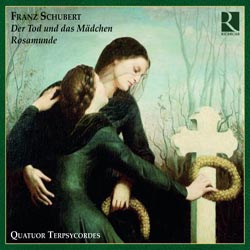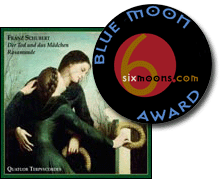 |
|||||||
 |
|||||||
 |
|||||||
 |
|||||||
Album Title: Franz Schubert: Der Tod und das Mädchen, Rosamunde Performer: Quatuor Terpsycordes Label: Ricercar RIC 272 Playing time: 76'58" Recorded: Studio Tibor Varga, Switzerland , January 2007 Be prepared. This recording of Schubert's most famous quartets is like a giant slap in the face, a rude awakening to anybody who thought they knew what those compositions sound like. Hence these reads will be a love or hate proposition. I can't see any possible middle ground for these radically non-classical yet most stimulating interpretations. |
|||||||
| The Quatuor Terpsychord performs on four instruments made by the Vuillaume studio of luthiers in the 19th century and made available by the Museum of Art and History in Geneva. One violin and the viola are copies of instruments originally crafted by Guarnerius del Gesu, the second violin a replica of Stradivarius' mythical Messiah violin (never played and forbidden to ever be played by its last owner) and the cello an exact copy of the no-less-famous Servais Stradivarius (named after Adrien Francois Servais, a Belgian cellist). The fact that these replicas of famous instruments by one of the most gifted family of violin makers since the 18th century came together for this performance is a rarity in and of itself. But they were also fitted with gut strings for a historical sound. Plus, bow maker Bruno Sporcq actually designed four 'classical' bows specifically for this performance to enable the musicians to express the full gamut of nuances those unique instruments are capable of. The sound of gut strings is very unique. It gives this quartet of instruments an inimitable timbre and grain (meant here in a very favorable way) that allows the musicians to completely expose the colors of Schubert's music on a palette of nuances not typically heard with the more rotund sound of modern instruments and metal strings. It's as though Schubert's music instantly lost its Viennese sugar coating, shed unnecessary weight and we finally accessed its previously hidden lean muscles and bones - disturbing at first but fully revelatory. Add the range of subtle nuances and articulation the modern bows allowed to reveal the tight connection between these string quartets and Schubert's most lyrical lieder. One ends up with a performance not completely 'historical' in its very supple hues but neither modern since timbres are clearly of the 'period' persuasion. The Quatuor Terpsychord born from the collision of an Italian, one Bulgarian and two Swiss was unknown to me before this disc but their youth and purposeful, clever and inventive rediscovery of Schubert's most traveled compositions won me over. Like a bucket of cold water, it opened my ears to what I had been missing in his music. Therefore I am granting this very unique performance one of our awards fully aware that such a radical read will not be to everyone's liking. Still, it is a mandatory discovery if you think you know Schubert. A few listening sessions might be required to come to fully appreciate the depth of this interpretation, to transcend the initial shock of discomfort and novelty. At least that was true for me. Once I got it however, I just could not get enough. |
|||||||
 |
|||||||
 |
|||||||